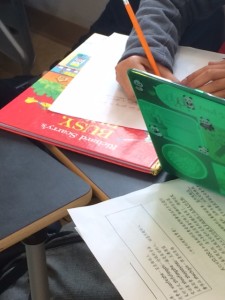The students in DC International School’s Seeding Social Innovation course have already successfully launched one social venture. And that was just in two weeks, during the first cycle of the social entrepreneurship elective made up of 6th, 7th and 8th graders.
The 24 students led a school-based book drive that collected more than 1,100 read aloud books for pre-k and kindergarten students. The drive was so successful that the class is planning to start a library at a local clinic or community center that is currently without any books for children.

These students are part of LearnServe International’s pilot program for Seeding Social Innovation, our in-school curriculum, with a twist. The original curriculum, based on the after school LearnServe Fellows program, was adapted for in-school teaching and, like the Fellows program, designed for high school students. Since they launched the pilot of Seeding Social Innovation in high schools last year, LearnServe realized that as transformative as the program is for youth in grades 9-12, there is a real shortage of hands-on programming targeting middle school students and engaging them in the fundamentals of creating positive social change. With the help of Andrew Molchany at DCI, the curriculum was adapted for younger audiences and is already being piloted in two local middle schools, with another to start later this year.
The course is divided into three units or cycles, each reinforcing the necessity of Understanding, Innovation and Action when it comes to making positive, lasting change in the world. The students in the course dig deep to identify root causes of problems that affect communities, both here in DC and around the world, and then actively design innovative solutions that do good for all involved.
Not all of the middle schoolers in the class will grow up to be social entrepreneurs. But they are already proof that innovative action for positive change is not just for adults and older teens. By giving youth the tools to make a difference earlier in life, they may enter high school, college, and adulthood more prepared and engaged to improve their comunities.
written by: Andrew Molchany, Director of Student Life, DC International School
